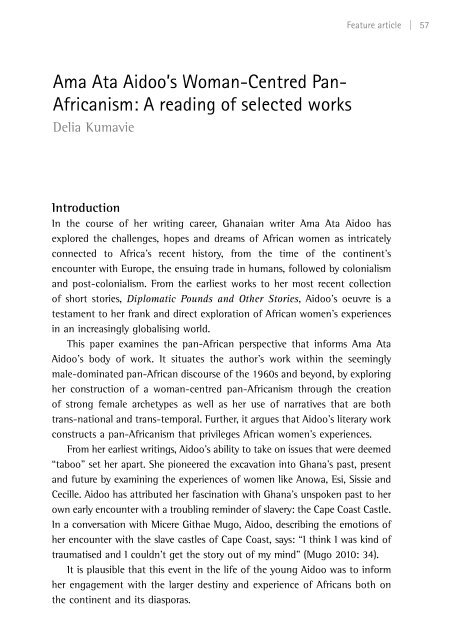Create successful ePaper yourself
Turn your PDF publications into a flip-book with our unique Google optimized e-Paper software.
Feature article | 57<br />
Ama Ata Aidoo’s Woman-Centred <strong>Pan</strong>-<br />
<strong>Africanism</strong>: A reading of selected works<br />
Delia Kumavie<br />
Introduction<br />
In the course of her writing career, Ghanaian writer Ama Ata Aidoo has<br />
explored the challenges, hopes <strong>and</strong> dreams of African women as intricately<br />
connected to Africa’s recent history, from the time of the continent’s<br />
encounter with Europe, the ensuing trade in humans, followed by colonialism<br />
<strong>and</strong> post-colonialism. From the earliest works to her most recent collection<br />
of short stories, Diplomatic Pounds <strong>and</strong> Other Stories, Aidoo’s oeuvre is a<br />
testament to her frank <strong>and</strong> direct exploration of African women’s experiences<br />
in an increasingly globalising world.<br />
This paper examines the pan-African perspective that informs Ama Ata<br />
Aidoo’s body of work. It situates the author’s work within the seemingly<br />
male-dominated pan-African discourse of the 1960s <strong>and</strong> beyond, by exploring<br />
her construction of a woman-centred pan-<strong>Africanism</strong> through the creation<br />
of strong female archetypes as well as her use of narratives that are both<br />
trans-national <strong>and</strong> trans-temporal. Further, it argues that Aidoo’s literary work<br />
constructs a pan-<strong>Africanism</strong> that privileges African women’s experiences.<br />
From her earliest writings, Aidoo’s ability to take on issues that were deemed<br />
“taboo” set her apart. She pioneered the excavation into Ghana’s past, present<br />
<strong>and</strong> future by examining the experiences of women like Anowa, Esi, Sissie <strong>and</strong><br />
Cecille. Aidoo has attributed her fascination with Ghana’s unspoken past to her<br />
own early encounter with a troubling reminder of slavery: the Cape Coast Castle.<br />
In a conversation with Micere Githae Mugo, Aidoo, describing the emotions of<br />
her encounter with the slave castles of Cape Coast, says: “I think I was kind of<br />
traumatised <strong>and</strong> I couldn’t get the story out of my mind” (Mugo 2010: 34).<br />
It is plausible that this event in the life of the young Aidoo was to inform<br />
her engagement with the larger destiny <strong>and</strong> experience of Africans both on<br />
the continent <strong>and</strong> its diasporas.


